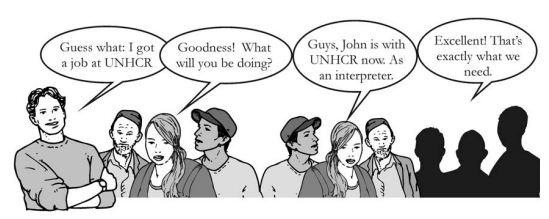Ethics of the profession
On this page I tēnei whārangi
The four main principles
You must adhere to the following major ethical principles which are listed below:
- Accuracy – no distortions in meaning; no additions or omissions
- Conflict of interests
- Impartiality and neutrality – accepting gifts & performing favours
- Confidentiality
Some images from “Self-Study Module 3: Interpreting in a Refugee Context
Self-Study Module 3: Interpreting in a refugee context(external link) — UNHCR - The UN Refugee Agency
Accuracy

Note: The interpreter shall not provide any kind of sociological, anthropological, or historical information to express or assist in developing an opinion on the case they are involved in.

Note: The interpreter is responsible for accurately translating without adding or omitting anything.
Conflict of interests / Impartiality and neutrality


Note: The interpreter shall not interpret for close relations and/or personal friends, except in emergency situations.
Confidentiality

Note: Under no circumstances shall the interpreter disclose or repeat oral and/or written information obtained in the course of their work at UNCHR for any reason.
Accepting gifts and performing personal favours

Note the interpreter shall never accept any additional compensation, money or any other favours.

